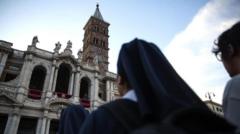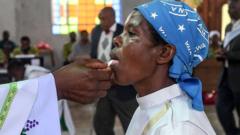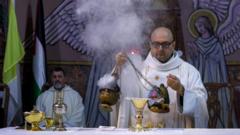As the College of Cardinals prepares to elect a new pope, the decision promises to shape the future of the Catholic Church. With a diverse lineup of candidates such as Cardinal Parolin, Cardinal Tagle, and Cardinal Ambongo, the conclave faces an unpredictable electoral process underscored by a historic shift away from European dominance.
The Next Papal Election: Unpacking Candidates in a Transformative Era

The Next Papal Election: Unpacking Candidates in a Transformative Era
The election of the next pope marks a significant juncture for the Catholic Church, featuring candidates from diverse cultural backgrounds and ideologies, reflecting unprecedented global representation.
The upcoming election for the next pope carries immense implications for the Catholic Church and the approximately 1.4 billion baptized Roman Catholics around the world. Characterized by an unpredictable atmosphere, the conclave in the Sistine Chapel is set to gather the College of Cardinals, where they will deliberate and vote until a consensus is reached on a single successor to Pope Francis.
With nearly 80% of the cardinals appointed during Pope Francis's tenure, this conclave represents not only a choice for a new pope but also a chance to provide a more varied, global perspective. Notably, for the first time in history, there will be fewer than half of the voting cardinals from Europe. The diversity within the College, which includes cardinals from Africa, Asia, and the Americas, complicates the future dynamics of the Church, as not all appointees align strictly with "progressive" or "traditionalist" camps, making predictions increasingly challenging.
Potential candidates being discussed for the papacy encompass various backgrounds and ideologies:
1. **Pietro Parolin (Italy, 70)** - The Vatican's Secretary of State, Parolin is seen as a frontrunner who prioritizes diplomacy and global outreach. Despite strong backing from bookmakers, he faces skepticism for his views on issues such as same-sex marriage.
2. **Luis Antonio Gokim Tagle (Philippines, 67)** - An influential pastoral figure with a substantial following in the Philippines, Tagle embodies a moderate approach and could shine light on the Church's stance toward social issues and LGBTQ+ discussions.
3. **Fridolin Ambongo Besungu (Democratic Republic of Congo, 65)** - Arching over a rapidly growing Catholic population in Africa, Ambongo's potential candidacy marks a significant shift toward the global south, despite his conservative approach on many social issues.
4. **Peter Kodwo Appiah Turkson (Ghana, 76)** - The first African cardinal, Turkson has a multifaceted background, merging advocacy for social issues with conservative beliefs and has refrained from pursuing an active interest in the papacy.
5. **Peter Erdo (Hungary, 72)** - As a conservative voice in the European Catholic Church, Erdo has gained recognition among various factions, presenting a potential compromise candidate amidst diverse debates.
6. **Robert Sarah (Guinea, 79)** - Though not a prominent contender, Sarah's reputation as a doctrinal traditionalist could resonate with conservative factions of the College.
7. **Angelo Scola (Italy, 83)** - While the former Archbishop of Milan has fallen from favor, he remains a respected voice, particularly following the release of his book on aging ahead of the conclave.
8. **Marc Ouellet (Canada, 80)** - He possesses significant experience but, at his age, may find it difficult to consolidate support effectively due to his absence from the conclave.
9. **Robert Prevost (USA, 69)** - The American cardinal possesses experience and connections but faces scrutiny over his younger age and past allegations related to clerical misconduct.
10. **Michael Czerny (Canada, 78)** - Another Jesuit and a candidate closely associated with social justice, Czerny’s alignment with progressive values might hinder his chances, not favoring a consecutive Jesuit papacy.
This election in the Vatican serves as a potential turning point in the Church’s trajectory, reflecting a significant shift in the demographics and ideologies influencing one of the world's oldest religious institutions. As the cardinals prepare to delve into deliberations, their decisions will have far-reaching implications for the global Catholic community.






















